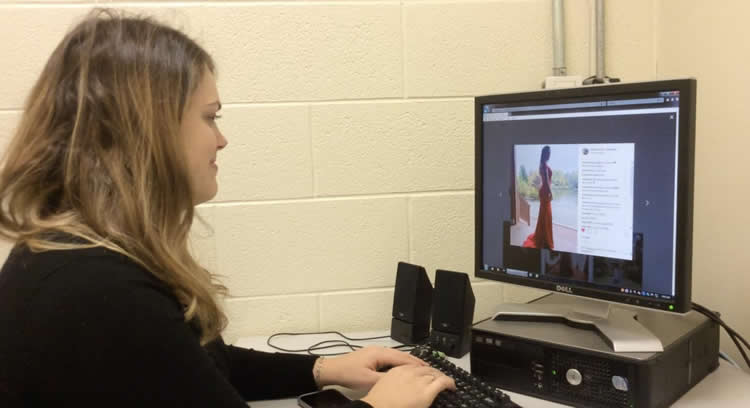Summary: According to researchers, social media use in young women can have a negative impact on the way they view their own bodies and appearance. The study reports women who engage with photos of friends they consider to be more attractive than themselves feel worse about their own appearance directly after viewing.
Source: York University.
Young women who actively engage with social media images of friends who they think are more attractive than themselves report feeling worse about their own appearance afterward, a York University study shows.
It’s no secret that social media can blur the lines on what’s real and what’s fantasy, but new research at York’s Faculty of Health now shows how young women interact with images online can affect how they feel about their own bodies.
The research entitled “The effects of active social media engagement with peers on body image in young women” appears in the journal Body Image. The study was conducted by Jennifer Mills, associate professor in the Department of Psychology and Jacqueline Hogue, a PhD student in the department’s Clinical Program. It focused on young women, aged 18 to 27 years old, who liked or commented on photos of people they deemed to be more attractive than themselves.
“The results showed that these young adult women felt more dissatisfied with their bodies,” says Mills. “They felt worse about their own appearance after looking at social media pages of someone that they perceived to be more attractive than them. Even if they felt bad about themselves before they came into the study, on average, they still felt worse after completing the task.”
The research included 118 female undergraduate students from diverse ethnic backgrounds. Participants reported their age, ethnicity, whether English was their first language, and years of post-secondary education in an online questionnaire six weeks before the experiment. Each participant was given a consent form and questionnaire where they had to indicate using a specific scale how satisfied or dissatisfied they were with their appearance or body image.
Participants were then randomly assigned into one of two experimental conditions. One group of participants were asked to log into Facebook and Instagram for a period of five or more minutes and find one peer that was the same age who they felt was more attractive than themselves. After looking at the photos, each participant was asked to leave a comment of their choice. In the control group, participants were asked to do the same task except this time comment on a post of a family member whom they did not think was more attractive than themselves. The data showed that participants’ views of their own appearance were not affected when interacting with their family members.

“I think in a lot of cases, young women who post to social media are hoping to get positive reinforcement for what they’re posting and the way in which women use social media is more appearance-based than it is for men.”
Mills said particularly in this age group, 18 to mid-20’s, appearance is very important, and women care a great deal about how they are perceived by other people. They are also most likely to use social media.
“When we compare ourselves to other people, that has the potential to affect the valuation of ourselves,” says Mills. We really need to educate young people on how social media use could be making them feel about themselves and how this could even be linked to stringent dieting, eating disorders or excessive exercise. There are people who may be triggered by social media and who are especially vulnerable.”
Source: Anjum Nayyar – York University
Publisher: Organized by NeuroscienceNews.com.
Image Source: NeuroscienceNews.com image is credited to York University News.
Original Research: Open access research for “The effects of active social media engagement with peers on body image in young women” by Jacqueline V. Hogue and Jennifer S. Mills in Neurology. Published November 12 2018.
doi:10.1016/j.bodyim.2018.11.002
[cbtabs][cbtab title=”MLA”]York University”Social Media’s Negative Impact on How We View Our Bodies.” NeuroscienceNews. NeuroscienceNews, 15 November 2018.
<https://neurosciencenews.com/body-image-social-media-10208/>.[/cbtab][cbtab title=”APA”]York University(2018, November 15). Social Media’s Negative Impact on How We View Our Bodies. NeuroscienceNews. Retrieved November 15, 2018 from https://neurosciencenews.com/body-image-social-media-10208/[/cbtab][cbtab title=”Chicago”]York University”Social Media’s Negative Impact on How We View Our Bodies.” https://neurosciencenews.com/body-image-social-media-10208/ (accessed November 15, 2018).[/cbtab][/cbtabs]
Abstract
The effects of active social media engagement with peers on body image in young women
This experimental study examined the effects of engaging on social media with attractive female peers on young adult women’s body image. Participants were 118 female undergraduate students randomly assigned to one of two experimental conditions. Participants first completed a visual analogue scale measure of state body image and then either browsed and left a comment on the social media site of an attractive female peer (n = 56) or did the same with a family member (n = 62) and then completed a post-manipulation visual analogue scale measure of state body image. A 2 × 2 mixed analysis of variance showed a significant interaction between condition and time. Follow-up t-tests revealed that young adult women who engaged with an attractive peer on social media subsequently experienced an increase in negative body image (dependence-corrected d = 0.13), whereas those who engaged with a family member did not (dependence-corrected d = 0.02). The findings suggest that upward appearance comparisons on social media may promote increased body image concerns in young adult women.







